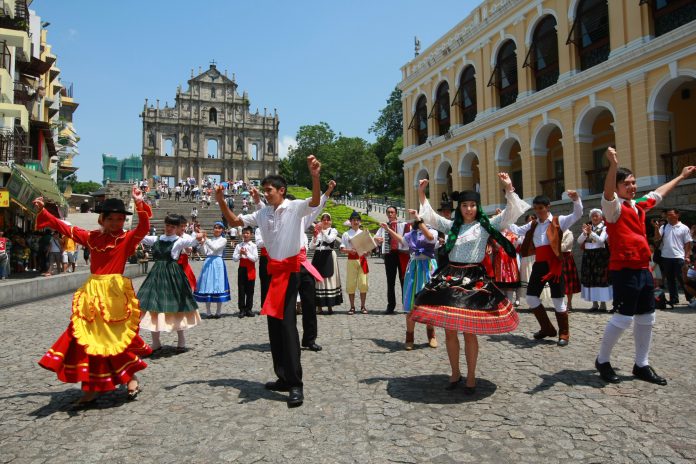Research Corner | A partnership between Macau Business and the Institute for Tourism Studies (IFT)
As Macau authorities increasingly look to festivals as a way to diversify the city’s tourism offering beyond gaming, officials should ensure these events have enough community support in order to be successful. So finds an academic study by two scholars from Macau’s Institute for Tourism Studies.
“Residents are the major stakeholders in community-based festivals, so their opinions towards festivals matter; because without their support sustainability and success cannot be achieved,” say IFT scholars Li Xiangping and Penny Wan.
Their paper – Residents’ Support for Festivals: Integration of emotional solidarity – was published last year in the Journal of Sustainable Tourism. Results indicate that residents’ perception of the positive impacts of festivals is influenced by ‘emotional solidarity’ and community attachment, with all three elements affecting resident support for festival development.
 The study results were based upon questionnaires answered by more than 300 respondents. The sample comprised people holding Macao permanent residency and living in the city for a minimum of seven years, all of whom were 18 years or older. In addition, they had to have attended at least one cultural festival from a pre-selected list of events over the past year.
The study results were based upon questionnaires answered by more than 300 respondents. The sample comprised people holding Macao permanent residency and living in the city for a minimum of seven years, all of whom were 18 years or older. In addition, they had to have attended at least one cultural festival from a pre-selected list of events over the past year.
‘Emotional solidarity’
According to the researchers, an increasing number of academic studies have been adopting the concept of ‘emotional solidarity’ as a theoretical framework in “examining how the bonding residents’ experience with tourists can influence the residents’ attitudes towards tourism development.”
Drs. Li and Wan concluded, based upon their survey, that the greater the degree to which residents “identified with tourism emotionally” then the “more likely” they were “to perceive festival impacts positively, thus supporting festival development”.

 In addition, the authors noted a “positive correlation between community attachment and emotional solidarity”, suggesting that a “feeling of solidarity by the residents with the community and with festival participants” could be determinants for understanding their attitude towards festival development as the exchange process between residents and tourists could go beyond the economic dimension.
In addition, the authors noted a “positive correlation between community attachment and emotional solidarity”, suggesting that a “feeling of solidarity by the residents with the community and with festival participants” could be determinants for understanding their attitude towards festival development as the exchange process between residents and tourists could go beyond the economic dimension.
“Especially in the festival context, the intangible impacts – namely, social and cultural impacts – are more important,” state the researchers.
Rallying support
In their study, Drs. Li and Wan provided a number of suggestions to Macao Government Tourism Office, and to festival planners and marketers, in order to “reduce the possibility of a community backlash” against tourists at Macau festivals.
The researchers noted that “since positive residents’ perceptions of festival benefits are directly associated with the community’s support level of tourism, tourism and festival planners should communicate the benefits of festival development, especially cultural and social benefits, through different marketing techniques and channels to gain local residents’ collaboration and support.”

 They highlighted this was particularly important in Macau, as the main purpose behind most festivals is not purely commercial but to diversify the city’s economy and its tourism offering.
They highlighted this was particularly important in Macau, as the main purpose behind most festivals is not purely commercial but to diversify the city’s economy and its tourism offering.
The IFT scholars suggested tourism and festival planners organise regular visits to community associations to explain the benefits to the public of hosting festivals, noting: “Macau has more than 4,000 local clan/community associations, many of which have a long history and are powerful in terms of influencing government policies and views of the local people.”
 The scholars suggested similar visits be made to educational institutions, from kindergartens to universities. “Through organising some activities (e.g.) bringing kids to some local festivals to experience the joys of participating in festivals and interacting with tourists, and campaigns like a drawing competition to let students think of the benefits of hosting festivals, with awareness by local people of the benefits of hosting festivals being enhanced.”
The scholars suggested similar visits be made to educational institutions, from kindergartens to universities. “Through organising some activities (e.g.) bringing kids to some local festivals to experience the joys of participating in festivals and interacting with tourists, and campaigns like a drawing competition to let students think of the benefits of hosting festivals, with awareness by local people of the benefits of hosting festivals being enhanced.”

Drs. Li and Wan also stated that – since their study found that residents were more positive about, and supportive of, development for the festival sector when those residents had a deeper degree of emotional solidarity with tourists – festival planners “should design festivals in such a way that facilitates beneficial interactions between residents and tourists.”
This could be done, the researchers argued, placing the emphasis upon fostering beliefs and behaviour shared by both groups. A third suggestion from the researchers was that festival planners should evaluate an event’s connections to the community prior to making it a festival.
“Equally important is to allow local residents to have a greater say in the decision-making of tourism and festival development,” Drs. Li and Wan added. “Through actively engaging in festival planning, residents’ sense of belonging and ownership towards the city and local festivals will be greatly enhanced.”
The researchers
 Li Xiangping is an assistant professor at Macau’s Institute for Tourism Studies (IFT). Dr. Li has a PhD in Hospitality and Tourism Management from the Virginia Polytechnic Institute and State University, in the United States. Her research interests include tourism planning and development, destination marketing, and tourist behaviour.
Li Xiangping is an assistant professor at Macau’s Institute for Tourism Studies (IFT). Dr. Li has a PhD in Hospitality and Tourism Management from the Virginia Polytechnic Institute and State University, in the United States. Her research interests include tourism planning and development, destination marketing, and tourist behaviour.
 IFT visiting assistant professor Penny Wan holds a PhD from the University of Hong Kong. Her academic research focuses on tourism planning and development, heritage conservation, casino gaming management, and hospitality services. Dr. Wan has served as an editorial board member and as a reviewer for several high-profile academic journals in the field of tourism.
IFT visiting assistant professor Penny Wan holds a PhD from the University of Hong Kong. Her academic research focuses on tourism planning and development, heritage conservation, casino gaming management, and hospitality services. Dr. Wan has served as an editorial board member and as a reviewer for several high-profile academic journals in the field of tourism.
The paper
Xiangping Li and Yim King Penny Wan: Residents’ Support for Festivals: Integration of emotional solidarity, Journal of Sustainable Tourism, Volume 25, Issue 4, pages 517-535, 2017.
https://doi.org/10.1080/09669582.2016.1224889
























